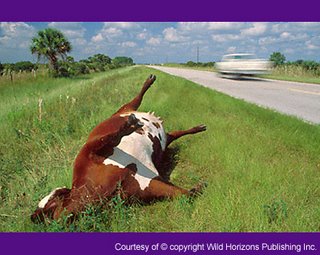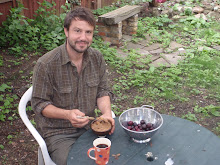ROADKILL

Lately, quite a few people have been asking me about roadkill. So I’m going to say a few words about it. Not that I eat it that much. At most it constitutes 1-5% of my diet throughout the year. Also, I would rarely if ever actively go out searching for it. Nevertheless, what I do want to say about roadkill is in large measure addressed by this wonderful video that I found on the web recently. Have a look first before we get down to some waffle and something more useful: the practicalities and pitfalls of roadkill eating.
Why eat roadkill? Why indeed?! Does eating roadkill simply represent a somewhat quirky or peculiar dimension to the forage/freegan/self-sufficient lifestyle? Maybe. For me it’s a simple equation: I love animals therefore I don’t eat them (roadkill excepted). I don’t want them killed for me to eat, nor do I wish to kill them. Of course, no doubt a strong intellectual argument could be used to support this position on moral grounds, or we could talk about it from a spiritual point of view, relating it to such concepts as karma and ahimsa– maybe some other time. The truth is I am sentimental; it’s an emotional thing. Huge Fearnley-Whittingstall has written about roadkill (see his A Cook on the Wild Side p.47) and about meat in general. See, for instance.
His position is one that I can understand and respect. His emphasis is on good animal husbandry, welfare and respect and, although you may think that, ultimately, killing an animal for food is not in the least bit respectful of that animal it can, in a sense, be so - at least relatively speaking. For me the least hypocritical position, and the position that gives you the greatest connection to, and understanding of the animal you wish to consume, is to only eat animals that you yourself have hunted and killed. Emotionally, though, I cannot do it! Perhaps, though, the future is heading not towards a reconnection with the food, including meat, that we eat, but a radical and horrific disconnection. Is this what we really want?
Anyway, occasionally I do like to eat meat. Also….., the fact is, I am very fond of our native wildlife and am extremely distressed at the number of animals and insects needlessly killed every day – needlessly killed due to human greed, recklessness, laziness, lack of awareness or concern and general environmental exploitation and mismanagement. At the same time, I find myself similarly distressed and concerned by our consumer society’s insatiable thirst and craving for cheap but, again, relatively speaking, nutritionally valueless, food. And so, two ideas collide and generate a surprising idea: eat roadkill. It’s not factory farmed or pumped full of antibiotics. It is fresh, local, seasonal and nutritionally rich. The most common finds are pheasant, squirrel, rabbit, fox, hedgehog, badger, moorhen, hare etc. This is certainly the case where I live, in
What’s good to eat and what’s not:
The best places to find roadkill are on stretches of road that you travel along daily. If it wasn’t there the previous day then it’s probably good to eat today. But, for goodness sake, don’t put your foot down to deliberately try and kill something. In fact if you are walking or cycling roadkill is easier to find. This is because many animals when hit are injured rather than killed outright. Consequently, they manage to reach the cover of grass and shrub by the roadside. Some animals, even if killed on impact, though dead, manage to kick their way into the grass verge by the sheer force of their spasmodic death throes. The slower pace of walking or cycling allows such animals to be noticed. Specimens need to be intact and, at the height of summer, not more than a day old; that time extending to three to four days in the colder winter months. If there is fresh blood on the road, this is a sign of recent death and, hence, freshness. Similarly, with respect to birds, if there are feathers blowing around the road this is the sign of a recent hit. In my experience – although I stand to be corrected – rigor mortis tends to set in 6-12 hours after an animal is killed. So, if you pick an animal up and it is as stiff as a board but still plump and fresh looking, this is a good sign. Also, if on a cold day the animal feels warm then, clearly, this is a strong indicator of recent death. Bad signs include: dull looking eyes, rotten smell, visible maggots or fly eggs around the eyes mouth/beak, rupture of the intestines, signs of sickness, or, suspicious death. If you see 5 badgers on the road within 200 metres, chances are a farmer is illegally killing them and putting them on the road to look like roadkill. Of course, some animals may have been legally poisoned, so it is worth asking local farmers if they are using poisons. As for bird flu…….I need to look into this.
Finally or perhaps it should be, firstly, before even considering inspecting a dead road-side animal for eating it is sensible to familiarise yourself with certain relevant laws, especially the Wildlife and Countryside Act 1981.
Of course, the Act also covers such birds as swans. As native wild birds, swans enjoy statutory protection under the Wildlife and Countryside Act 1981 and it is an offence to intentionally injure, take or kill a wild swan. The Act similarly protects the eggs and nests of swans. It is an offence to take or possess the egg of a wild mute swan, or to damage or destroy the nest of a mute swan whilst in use or being built. Unfortunately, swans and their nests are sometimes a target for vandals.
Anyone seeing an offence against swans or other wildlife is encouraged to contact their police Wildlife Liaison Officer through their local police station.
Source: Swans wildlife information leaflet (2002)
Under the Countryside Act and Rights of Way Act 2000, people who kill swans face a maximum £5,000 fine and/or six months in prison.


13 Comments:
Interesting article, i've never thought about roadkill. now i will.
haha, nice picture of the cow at the top. But probably not roadkill - any vehicle that hit an animal that size would be totalled, and in pretty bad shape itself.
At Oxford, on pastoral lawns,
Fergus wanted to bugger the swans.
Said the loyal hall porter,
O, please, take my daughter!
Them swans is reserved for the dons.
Really good information. Thanks for sharing it. x
I am living in Spain, but I watch the BBC via satellite and saw your program yesterday night (Roadkill chef).
It was an inspiring and beautifully produced program and I am sure it will help to make people think a bit about their food habits in todays' "supermarketed" world.
It is a shame, though, that the BBC choose to give more importance (and the title) to the roadkill part of it.
I also found your website and blog very interesting, your're in my bookmarks already!
Just saw your story on Nightline. I find great value in your all-natural, green approach to eating. I'm passing your site along to all of my friends.
I liked the roadkill ideas. We're also keen on wild food of various sorts and we have done a seasonsal recipe for pigeon at:
http://www.woodlands.co.uk/blog/wild-food/wild-food-seasonal-cookery/
It is strangely reassuring to me that I'm not the only person walking the first world who has looked at a road killed animal and thought - "I wonder if it would be okay..."
Great piece...
- Farmer
I wondered if anyone knows the legalities of serving road kill to the public? Clearly serving it to friends is fine providing they are happy to eat it, but is it the same for the public? I only ask as I recall watching a programme a few years back which involved the food standards agency having to check the meat, although it was in the end fine providing it wasn't sold. Does anyone know whether this is accurate, or the intricacies of the law regarding this. Thanks!!!
I am told that it is not lawful to pick up the carcass of an animal or bird that has been killed by the vehicle in which you are travelling BUT that it is lawful to pick up a carcass that has been killed by another vehicle.
Is that correct??
There could be some sense in this as it would not encourage someone to try to kill an animal or bird that is on the road.
Hi Fergus, Your girlfriend popped into my exhibition asking for help feeding you. No Problem Duck and buzzard will be available if you like. Plus if you want to discover more about curing and tanning hides for clothing use. No Problem. Ref:Road Kill The Last supper
Great article, i did see your programe 'ROADKILL CHEIF'. Brilliant!! Could i add though, please be carful with venison. Theres the old story about the man who fed his dog some, the dog DIED. Turns out a vet had given the Deer a leathal injection.
Fergus i have this idea would love to here your thoughts. I'm thinking of setting up a Farmers market stall selling and promoting wild foraged foods. Sorry to say including, SHOT MEAT. Everything from Fungi to Nettles to seaweed. Ian Bennet you are correct in what you said. Cheers Ady.
I arrived at your blog via the wooden door in the tree. I had a dream about a pirate who gave me a bag of pearls, and I googled pearls for some deeper meaning and of course stumbled upon wisdom and enlightenment. Google eventually sent me to you via Whitstable and Oysters, thus the mystery of the pearl was over. The next night I dreamt about Black Beard and discovered that he was killed by the captain of HMS Pearl, and if there are Pirate Gods they seem to like me.
But for the Foraging Fergus I believe he must concentarate upon his foraging courses, I'll sign up with a group of others if you convoy details. Sometimes grand gestures seem like the best thing to do, but right now we are falling into a grand storm of crises. Don't know if you heard about the guy who decided to travel from Bristol to india, without money, and on foot, wearing groovy orange trousers. Sadly in France he had to stop, because the lack of french speaking skills meant they didn't get him at all. His story spread across the net, all over the world in fact, and it just didn't matter whether he made it.
People need your skills right now.
Fergus think about everything you ever hoped would happen, and everything you were ever afraid might, and then remember you've always been on the right path.
Post a Comment
<< Home